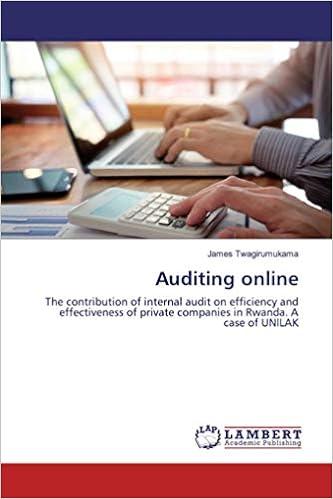Question
1. The standard for direct labor for product B is two hours at $20 per hour. If a firm produces 200 units of product B
1. The standard for direct labor for product B is two hours at $20 per hour. If a firm produces 200 units of product B and uses 410 hours at $18 per hour, the direct labor efficiency variance is
Select one:
a. $200 unfavorable
b. $200 favorable
c. $400 unfavorable
d. $400 favorable
2.The difference between the actual overhead cost and the flexible budget level of overhead for actual production is called
Select one:
a. Overhead volume variance
b. Controllable overhead variance
c. Budget variance
d. None of the above
3.The overhead variance between the actual production and the anticipated production is
Select one:
a. The overhead volume variance
b. The controllable overhead variance
c. The flexible budget variance
d. None of the above
4.If the standard for direct materials is 5 ft. at $10 per square foot for each unit produced what is the direct materials price variance if 100 units are produced, 510 ft. are used and $9 per square foot is paid?
Select one:
a. 510 favorable
b. $510 unfavorable
c. $100 unfavorable
d. $100 favorable
5.Standards may be viewed by labor as too loose. T/F
6.The standard for direct materials for product A is 6 ft. at $10 per square foot. If a firm produces 100 units of product A and uses 600 ft. at $11 per square foot, the materials quantity variance is
Select one:
a. $660 unfavorable
b. $660 favorable
c. 0
d. None of the above
7.The standard for direct materials for product A is 6 ft. at $10 per square foot. If a firm produces 100 units of product A and uses 600 ft. at $11 per square foot, the materials price variance is
Select one:
a. $660 unfavorable
b. $660 favorable
c. $600 unfavorable
d. $600 favorable
8.To calculate the overhead volume variance actual overhead costs are required. T/F
9.To calculate the controllable overhead variance actual overhead costs are needed. T/F
10.Overhead volume variance is a production indicator. T/F
Step by Step Solution
There are 3 Steps involved in it
Step: 1

Get Instant Access to Expert-Tailored Solutions
See step-by-step solutions with expert insights and AI powered tools for academic success
Step: 2

Step: 3

Ace Your Homework with AI
Get the answers you need in no time with our AI-driven, step-by-step assistance
Get Started


